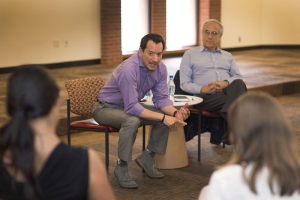CA State Assembly Speaker Anthony Rendon Offers Advice for Social Workers
April 26, 2017 / by Maya Meinert- Giving
“When I started in the nonprofit sector 15 years ago, I hadn’t studied social work. I had studied philosophy. But then I had to do budgets and outreach, and realized I needed a social worker, a budget person,” said California State Assembly Speaker Anthony Rendon to a group of students, staff and faculty from the USC Suzanne Dworak-Peck School of Social Work.
“This program at USC, in particular, produces people who know how to apply solutions to real problems.”
Rendon, who visited the University Park campus on April 21 at the invitation of Adjunct Lecturer Peter Braun, also represents the 63rd Assembly District encompassing nine Los Angeles County cities centrally located south of the city of Los Angeles. At this intimate gathering of social welfare professionals and enthusiasts, Rendon discussed past and current legislation, as well as the most effective avenues for advocacy. Since Rendon became speaker in March 2016, the Assembly has passed a series of landmark legislation, including the country’s first $15 minimum wage, extension of the state’s climate change reduction goals, overtime pay for farmworkers, and groundbreaking policies on gun and tobacco use.
Drawing upon his experience as a nonprofit executive and elected official, Rendon, who previously worked in social and medical services for children and gang reduction, offered these words of advice to our Master of Social Work students and those interested in advocating for others.
How to best advocate for others:
“Add longitudinal studies to your arguments, but also use anecdotes. The most effective advocates are people going to a district office and telling stories about impacts on children and families.”
How to best provide services for clients:
“Be really aware of what’s happening in Sacramento. No matter what your issue is – whether it’s mental health, veterans, homelessness or whatever – it’s the same conversation. The issues are not isolated. Make sure to develop relationships and have conversations so you can work with partners to advocate for what you need.”
How to stay connected as a policy maker:
“As a former nonprofit executive, I was used to seeing the recipients of services with my own eyes right outside my door. You don’t see that in Sacramento. We don’t provide services as a state, but we provide money for those services. It’s very abstract, so it’s important to keep going to events in your district so you don’t have that abstraction.”
How to overcome challenges as a policy maker:
“When I first became a legislator, I didn’t realize how bills get changed when they go through committee. It’s kind of like being a kid and negotiating your allowance: if you want $3, you have to ask for $5. Fill your bills with lots of stuff because it’s going to get stripped away.”
How to stay on top of your game:
“Always stay close to a university. So many great ideas happen here and come together. Being engaged in the exchange of new ideas makes you more intellectually curious – it made me a better nonprofit executive and makes me a better legislator.”
To reference the work of our faculty online, we ask that you directly quote their work where possible and attribute it to "FACULTY NAME, a professor in the USC Suzanne Dworak-Peck School of Social Work” (LINK: https://dworakpeck.usc.edu)
